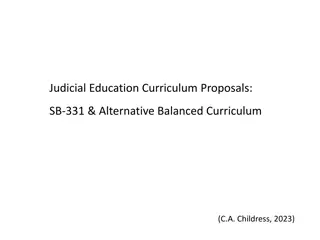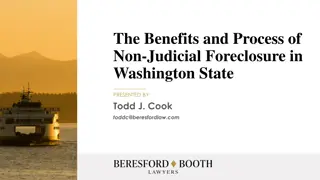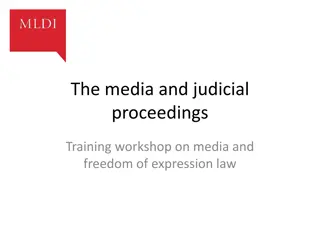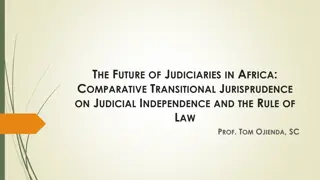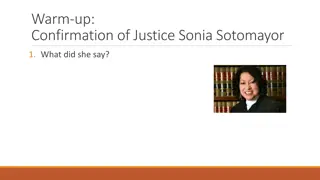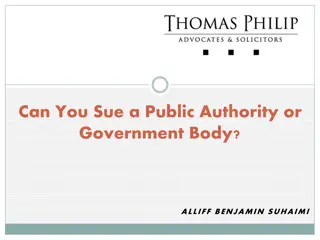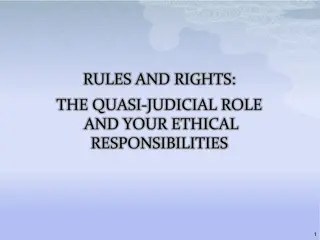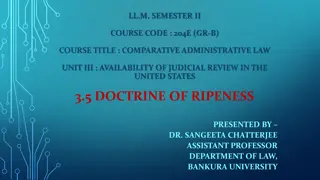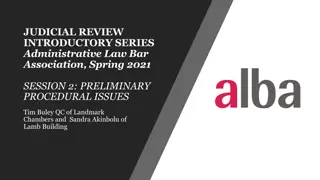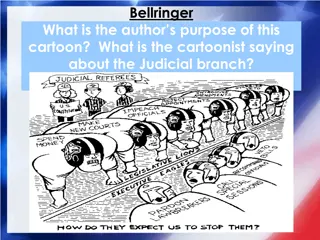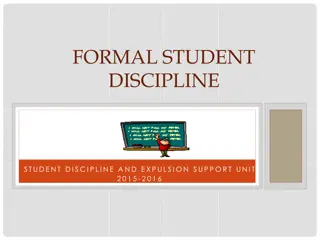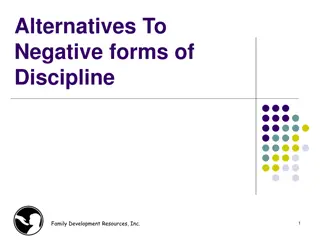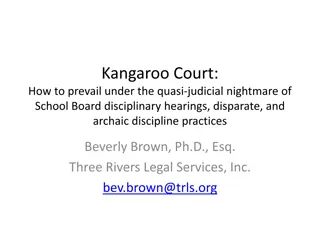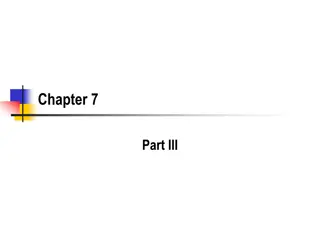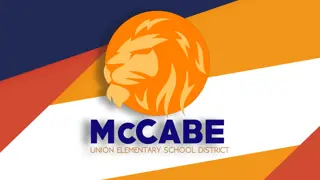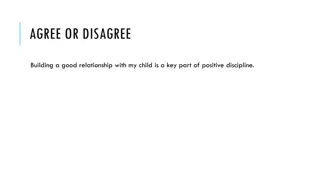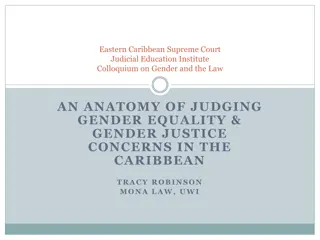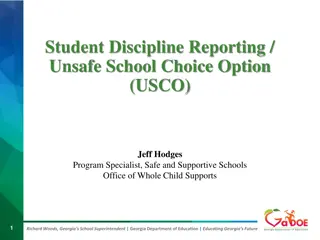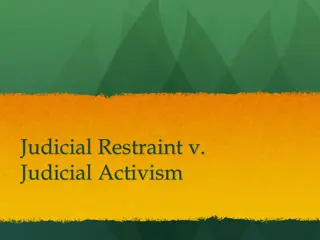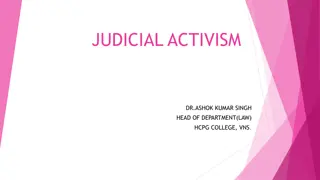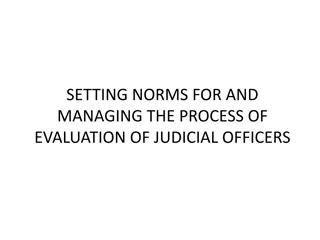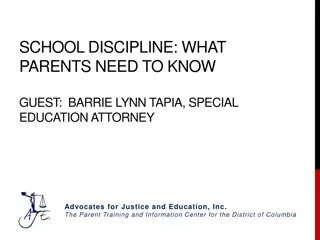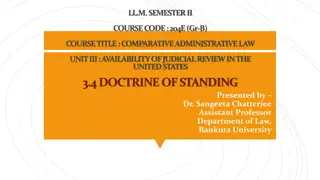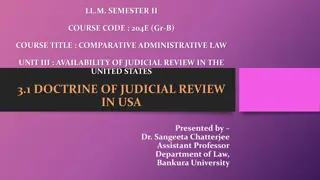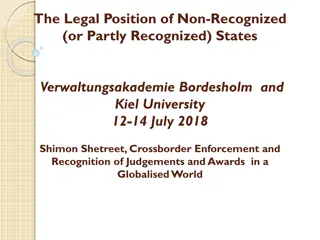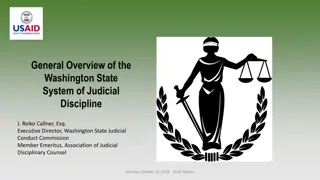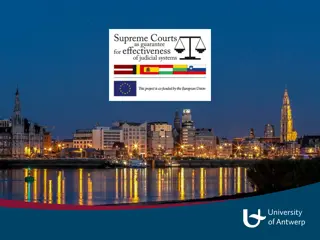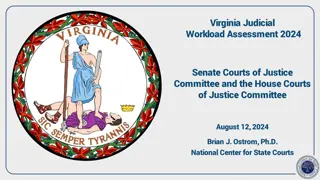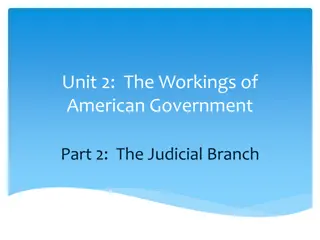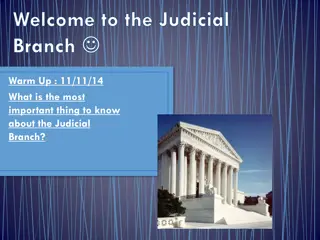Judicial Education Curriculum Proposals: SB-331 Overview
This content presents a series of proposals under SB-331 focusing on judicial education curriculum enhancements. It covers topics such as child abuse, psychological control, bias, trauma, intimate partner violence (IPV), and more. The proposals aim to equip judicial professionals with knowledge and
1 views • 15 slides
JUDICIAL REVIEW OF NATIONAL ACTION BY UNCLOS COURTS AND TRIBUNALS
International judicial review involves oversight by international courts and tribunals over the actions of States Parties in implementing their international commitments. UNCLOS courts exercise supervisory jurisdiction through grounds of review like due regard, reasonableness, necessity, and proport
1 views • 7 slides
Florida Judicial Ethics 2024: Learning Objectives and Resources
Explore common problems under the Code of Judicial Conduct, develop solutions and strategies, and utilize available resources to ensure ethical conduct in the judicial system. Judge Kroll and Mr. Teagle provide educational content but encourage individual analysis. Consult the Florida Judicial Code,
1 views • 81 slides
Overview of Non-Judicial Foreclosure Process in Washington State
Understanding the benefits and process of non-judicial foreclosure in Washington State, including the definition of foreclosure, two types of foreclosures, the reasons for choosing non-judicial foreclosure, who is eligible for this process, and the steps involved, such as the notice of default and t
0 views • 14 slides
Importance of Media in Judicial Proceedings: Safeguarding Fair Trials
Media plays a crucial role in ensuring the right to a fair trial by providing transparency, scrutiny, and accountability in judicial proceedings. Open justice, supported by media coverage, helps prevent miscarriages of justice and upholds fairness in legal processes. While media freedom is essential
3 views • 18 slides
Legal Education and Judicial Ethics Seminar - Transforming Legal Cultures
Enhance your understanding of the CPR overriding objective and its interpretative mandates in the legal context. Explore concepts of substantive and procedural justice, principles of proportionality, and the judicial oath of office. Delve into the Supreme Law of the Bahamas, right to protection of t
0 views • 54 slides
Essential Responsibilities and Management in Judicial Court System
Explore the vital aspects of maintaining judicial records, court management, judge responsibilities, and court work division in the judicial system. Learn about the skill sets required for effective court management, essential duties of a judge, and the administrative functions involved in the judic
0 views • 50 slides
The Future of Judiciaries in Africa: Comparative Transitional Jurisprudence
Judicial independence in Africa is crucial for upholding the rule of law and fostering economic growth. This article explores the key aspects of judicial independence, the challenges faced in implementing it, and the impact on governance and human rights. Countries in transition, such as Kenya, are
0 views • 25 slides
Enhancing Judicial Capacity for Environmental Law: Curriculum and Challenges
Environmental law curriculum for judicial education emphasizes the importance of knowledge and expertise in handling environmental justice issues. Prerequisites include competent rule of law, mature judicial system, independent bar, and well-equipped enforcement agencies. To address challenges faced
0 views • 18 slides
Understanding the Influences on Supreme Court Decision Making
Explore the essential aspects that influence how Supreme Court judges decide cases, including issues like judicial restraint vs. activism, influences on decision-making, precedent, and judicial philosophy such as originalism. Gain insights into the complexities surrounding constitutional interpretat
0 views • 9 slides
Understanding Judicial Review in Suing Public Authorities
Judicial review is the inherent right of courts to review decision-making processes of public bodies. It allows for challenging and analyzing decisions, granting public law remedies like declaration, certiorari, mandamus, prohibition, and quo warranto. Those adversely affected by public duty actions
0 views • 13 slides
Ensuring Judicial Independence and Accountability: Model Code of Judicial Conduct
An overview of the history and significance of the Model Code of Judicial Conduct, focusing on judicial independence, integrity, and accountability. The discussion highlights the crucial role of an impartial judiciary in upholding the rule of law and the efforts made to update and maintain ethical s
0 views • 16 slides
Quasi-Judicial Roles and Ethical Responsibilities in Decision-Making
Exploring the distinction between legislative and quasi-judicial roles in decision-making processes, this content delves into examples, principles, and ethical responsibilities. It emphasizes fairness, impartiality, and the importance of public trust in upholding ethical standards within quasi-judic
0 views • 34 slides
Understanding the Doctrine of Ripeness in Judicial Review
The doctrine of ripeness in judicial review focuses on the timing of court intervention, ensuring that cases are mature enough for adjudication. It aims to prevent premature decisions and conflicts with other branches of government, emphasizing the need for cases to be fit for judicial review before
0 views • 12 slides
Key Duties and Propositions in Judicial Review Proceedings
Key duties and propositions in judicial review proceedings emphasize the importance of cooperation, full disclosure of material facts, and the duty of candor to ensure fairness and uphold the rule of law. Judicial parties are expected to work collaboratively with the court and each other, providing
0 views • 13 slides
The Marbury v. Madison Case: Judicial Review and Constitutional Power
The Marbury v. Madison case explores the power of judicial review in the United States. It delves into the conflict between President Thomas Jefferson and the Judicial branch over political appointments, leading to a landmark Supreme Court decision on the interpretation of the Constitution. John Mar
0 views • 16 slides
Student Discipline and Expulsion Support Unit - Services and Guidelines
Student Discipline and Expulsion Support Unit (SDES) provides pre-expulsion and post-expulsion services to assist students in achieving reinstatement after expulsion. They offer specialized legal and procedural support, conduct hearings, and monitor student progress. The unit follows relevant laws a
0 views • 37 slides
Understanding Positive Discipline Techniques for Effective Parenting
Children have the right to a nurturing environment free from violence and shame. Negative discipline methods like spanking and yelling can have long-lasting negative impacts on a child's development. By understanding the reasons behind negative discipline practices and exploring alternative positive
1 views • 15 slides
Navigating School Board Disciplinary Hearings: Strategies for Success
Prevail in school board disciplinary hearings with expert advice from Beverly Brown, Ph.D., Esq. Explore the challenges of disparate discipline practices, understand compulsory attendance laws, and discover effective school responses to student behavior. Learn about due process, privileges, poverty
0 views • 91 slides
Understanding Judicial Review in Administrative Law
In this chapter, the concept of judicial review in administrative law is explored, focusing on the scope of review set by Congress, including trial de novo and independent judgment on evidence. Different standards of review, such as clearly erroneous and substantial evidence, are discussed, highligh
0 views • 23 slides
School Bus Conduct and Discipline Policies for Students
This document outlines the policies and procedures regarding school bus conduct and discipline for students. It covers rules such as following the bus driver's instructions, no eating or drinking on the bus, keeping the bus clean, and refraining from bullying or cyberbullying. The progressive discip
0 views • 22 slides
Colorado Department of Transportation Progressive Discipline Course Overview
This course offered by the Colorado Department of Transportation focuses on Progressive Discipline, covering topics such as the process of progressive discipline, resolving performance issues, connecting performance management with discipline, and resources available for supervisors/managers. Partic
0 views • 55 slides
Positive Discipline Strategies for Building a Strong Parent-Child Relationship
Developing a positive relationship with your child is crucial for effective discipline. It involves catching them being good, setting clear expectations, childproofing the environment, and using positive reinforcement rather than physical punishment. Understanding the difference between discipline a
0 views • 22 slides
Gender Equality and Judicial Independence in the Caribbean
This content explores the role of judges in promoting gender equality and justice in the Caribbean region, discussing preliminary points, judicial independence, and the rule of law. It emphasizes the importance of judges maintaining professional competence and independence to address gender equality
0 views • 30 slides
Understanding Student Discipline Reporting and the Discipline Matrix in Georgia Schools
Explore the Student Discipline Reporting and Unsafe School Choice Option program in Georgia schools, led by Jeff Hodges and Richard Woods. Learn about the Discipline Matrix, its purpose, and how it improves data accuracy, transparency, and addresses concerns related to discipline actions. Discover h
0 views • 35 slides
Understanding Judicial Restraint vs. Judicial Activism & Selective Incorporation in U.S. Law
Judicial restraint emphasizes a strict interpretation of the Constitution, while judicial activism advocates for a flexible approach to adapt to modern circumstances. Selective incorporation examines the application of the Bill of Rights to state actions, especially relevant during the 14th Amendmen
0 views • 13 slides
Understanding Judicial Activism and Judicial Review in Legal Systems
Judicial activism involves the use of judicial power to benefit society, expanding judicial review to declare laws unconstitutional. The courts need to be active to protect constitutional rights, as the executive and legislative branches may fail in their duties. Judicial activism in India, through
0 views • 9 slides
Practice and Procedure in Judicial Review: Factual Evidence and Interveners
The content provides valuable insights into the practice and procedure regarding factual evidence and interveners in judicial review cases. It covers general rules, recent cases, applications for oral evidence, questioning witnesses, opinion evidence, and the role of interveners. Key points include
0 views • 28 slides
Setting Norms and Managing Evaluation of Judicial Officers
Evaluation of judicial officers is crucial to establish institutional objectives, set performance standards, and promote accountability. This process involves assessing individual performance, managing systemic changes, and identifying areas for improvement. By setting parameters and utilizing a des
0 views • 16 slides
Important Information for Parents: School Discipline Updates and Student Rights
Learn about recent updates regarding school discipline, including the Student Fair Access to School Amendment Act of 2018 in the District of Columbia. Understand the changes in handling discipline in all schools over the next few years, limits on suspensions, expulsions, and transfers, and student r
0 views • 8 slides
The Structure and Function of the Judicial Branch in the US Constitution
The United States Constitution establishes the judicial power in the Supreme Court and other inferior courts as ordained by Congress. It outlines the qualifications, appointment process, and benefits for federal and state-level judges, as well as the importance of judicial independence. The content
0 views • 39 slides
Understanding the Doctrine of Standing in US Judicial Review
The doctrine of standing in United States judicial review is explained, focusing on the capacity of a plaintiff to seek judicial review based on injury-in-fact, causation, and redressability. The requirements of the standing doctrine and its relation to Article III of the US Constitution are discuss
0 views • 12 slides
Climate Change Litigation in Aotearoa/New Zealand: LCANZI Action and Judicial Review
The Lawyers for Climate Action NZ Incorporated (LCANZI) are actively involved in climate change litigation in Aotearoa/New Zealand, including challenging government decisions related to climate responses. A notable case involved a judicial review against Auckland Transport, where the High Court refu
0 views • 6 slides
Understanding the Doctrine of Judicial Review in the United States
Judicial Review is a crucial power of the judiciary to review the constitutionality of laws and executive orders. This article explores the origin of Judicial Review in the United States, focusing on the landmark case of Marbury v. Madison. It delves into the concept, importance, and application of
0 views • 14 slides
Ensuring Judicial Independence for Global Enforcement
Prominent legal scholar Shimon Shetreet discusses the importance of maintaining the integrity and independence of judicial systems in the context of cross-border enforcement of judgments and awards. The key aspects include creating institutional structures, constitutional safeguards, legislative pro
0 views • 46 slides
Overview of Washington State Judicial Discipline System
The Washington State system of judicial discipline aims to ensure accountability and safeguard judicial independence. It enforces a Code of Judicial Conduct with canons focused on upholding integrity, impartiality, and avoiding impropriety. Each canon contains enforceable rules, and comments provide
0 views • 15 slides
Role of Supreme Courts in Ensuring Effective Judicial Systems in the European Union
This communication focuses on the vital role of Supreme Courts in guaranteeing the effectiveness of judicial systems within the European Union. It delves into the significance of courts' communication strategies, emphasizing accessibility of justice, trust-building, and public image. The discussion
0 views • 29 slides
Virginia Judicial Workload Assessment 2024 Overview
The Virginia Judicial Workload Assessment 2024 aims to provide an objective measure of judicial workload for determining judgeships. It involves a comprehensive approach using quantitative and qualitative data to assess the need for judges in Circuit, General District, and Juvenile & Domestic Relati
0 views • 27 slides
The American Judicial Branch: Structure and Judicial Review
The American judicial system consists of District Courts, Appellate Courts, and the Supreme Court. District Courts handle initial cases, Appellate Courts hear appeals, and the Supreme Court is the highest authority. Justices are nominated by the President and confirmed by the Senate. Judicial review
0 views • 12 slides
Understanding the Judicial Branch of Government
The Judicial Branch, established by Article III of the Constitution, is vital for interpreting laws, upholding the Constitution through judicial review, and providing checks and balances on the legislative and executive branches. The Supreme Court, alongside lower federal courts, plays a crucial rol
0 views • 40 slides
